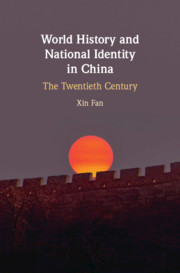Book contents
- World History and National Identity in China
- World History and National Identity in China
- Copyright page
- Dedication
- Contents
- Figures and Tables
- Preface and Acknowledgments
- Introduction: Control and Resistance
- 1 The Confucian Legacy
- 2 The Cultural Destiny
- 3 Becoming the “World”
- 4 The Forced Analogy
- 5 Imagining Global Antiquity
- Conclusion: World History and the Value of the Past
- List of Characters
- Bibliography
- Index
3 - Becoming the “World”
World Historians in the Early People’s Republic
Published online by Cambridge University Press: 19 February 2021
- World History and National Identity in China
- World History and National Identity in China
- Copyright page
- Dedication
- Contents
- Figures and Tables
- Preface and Acknowledgments
- Introduction: Control and Resistance
- 1 The Confucian Legacy
- 2 The Cultural Destiny
- 3 Becoming the “World”
- 4 The Forced Analogy
- 5 Imagining Global Antiquity
- Conclusion: World History and the Value of the Past
- List of Characters
- Bibliography
- Index
Summary
In the early People’s Republic, the socialist state sought total control of history as a field of knowledge production. The state introduced Soviet concepts of Marxist historiography, established a standard curriculum, and put a new academic infrastructure in place that was characterized by a teaching and research unit (jiaoyanshi) system. This development placed the world-historical discipline in a difficult position and shaped the key dynamic for the later rise of nationalism among Chinese historians. This chapter analyzes the paradox facing world historians Lin Zhichun and Tong Shuye as they tried to negotiate this emerging and complex academic, political environment. On the one hand, as up-and-coming professionals eager to develop their careers, they were inclined to collaborate with the state; on the other hand, as academics, they still cherished the ideal of intellectual autonomy. Their experiences with the regime formed a sharp contrast to those who were less willing to be coerced by the regime, such as Lei Haizong and Wu Mi. The latter found themselves constantly facing the distrust, surveillance, and oppression of the totalizing state.
- Type
- Chapter
- Information
- World History and National Identity in ChinaThe Twentieth Century, pp. 86 - 127Publisher: Cambridge University PressPrint publication year: 2021

